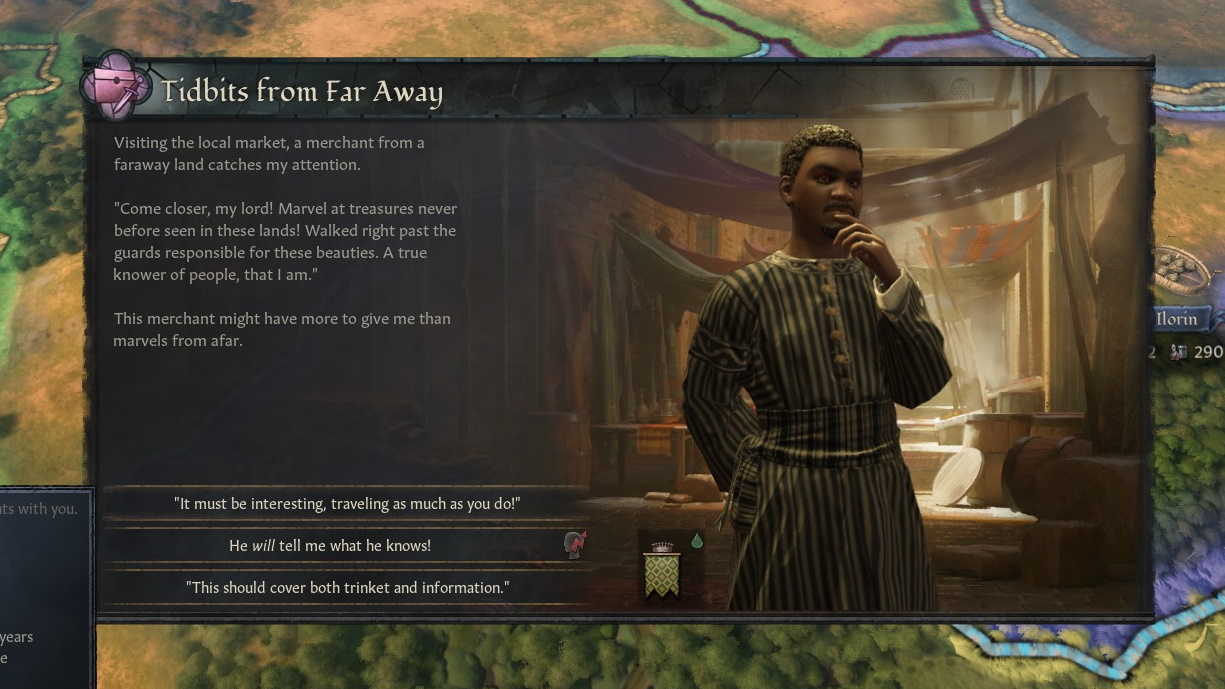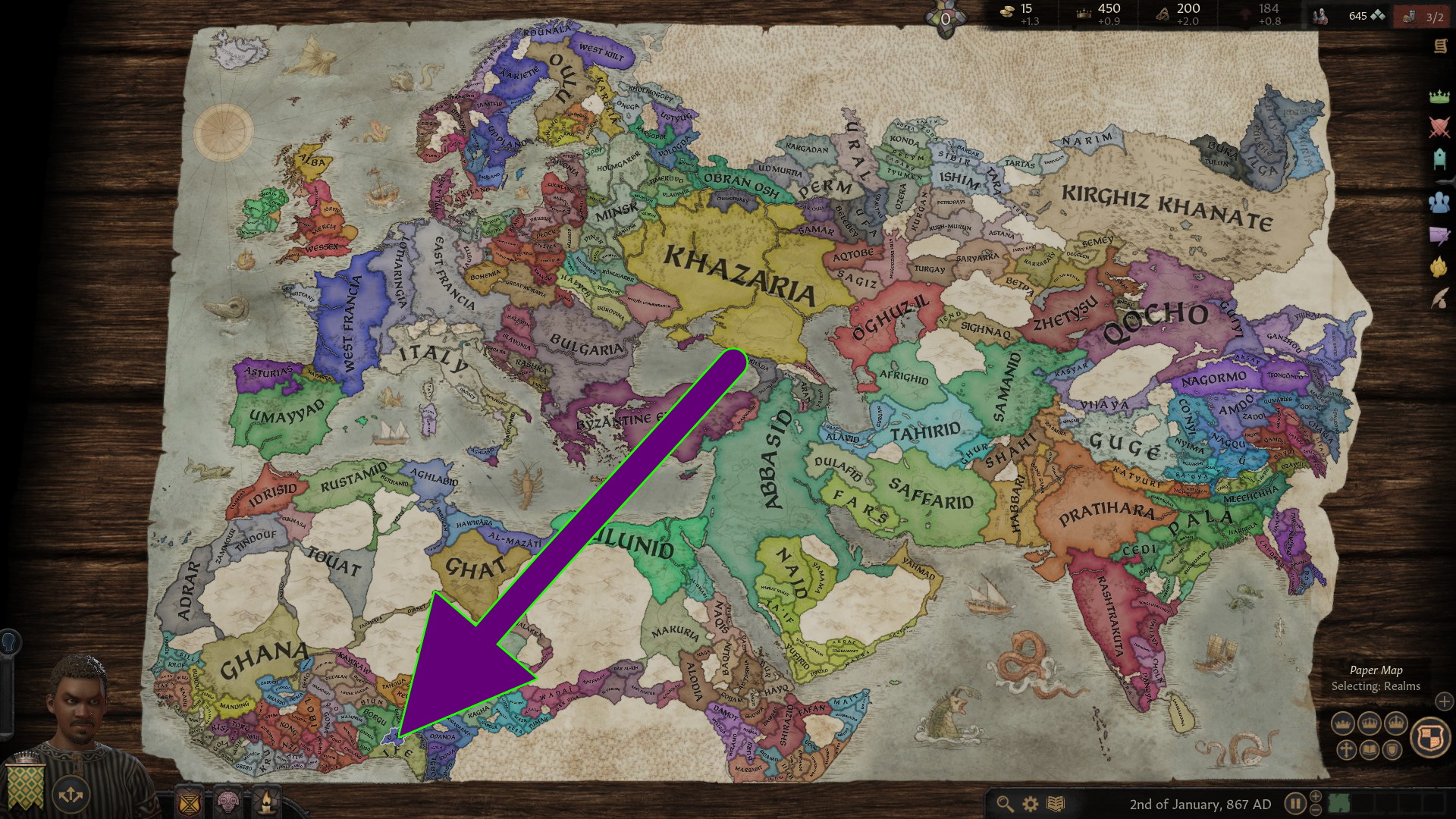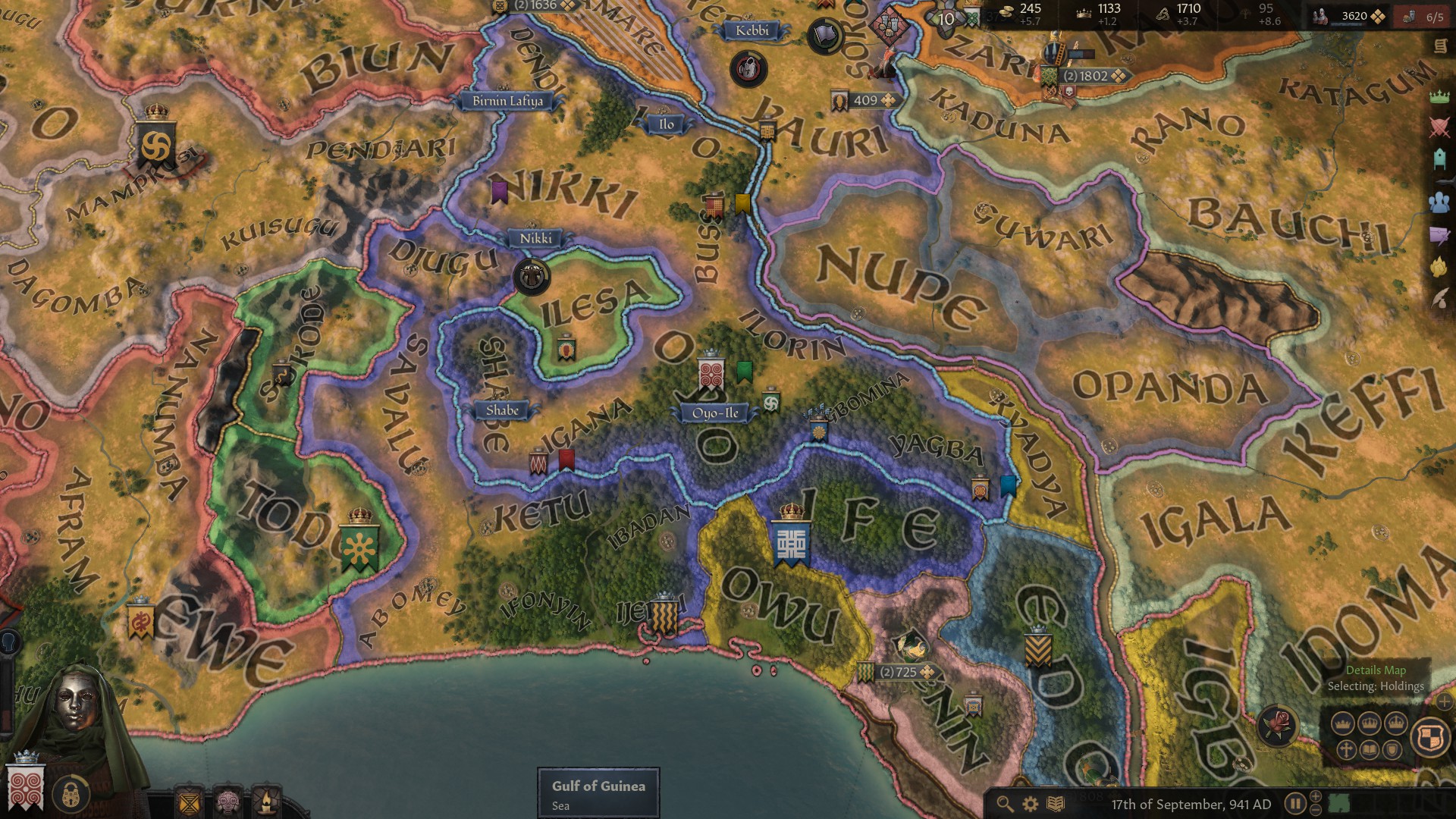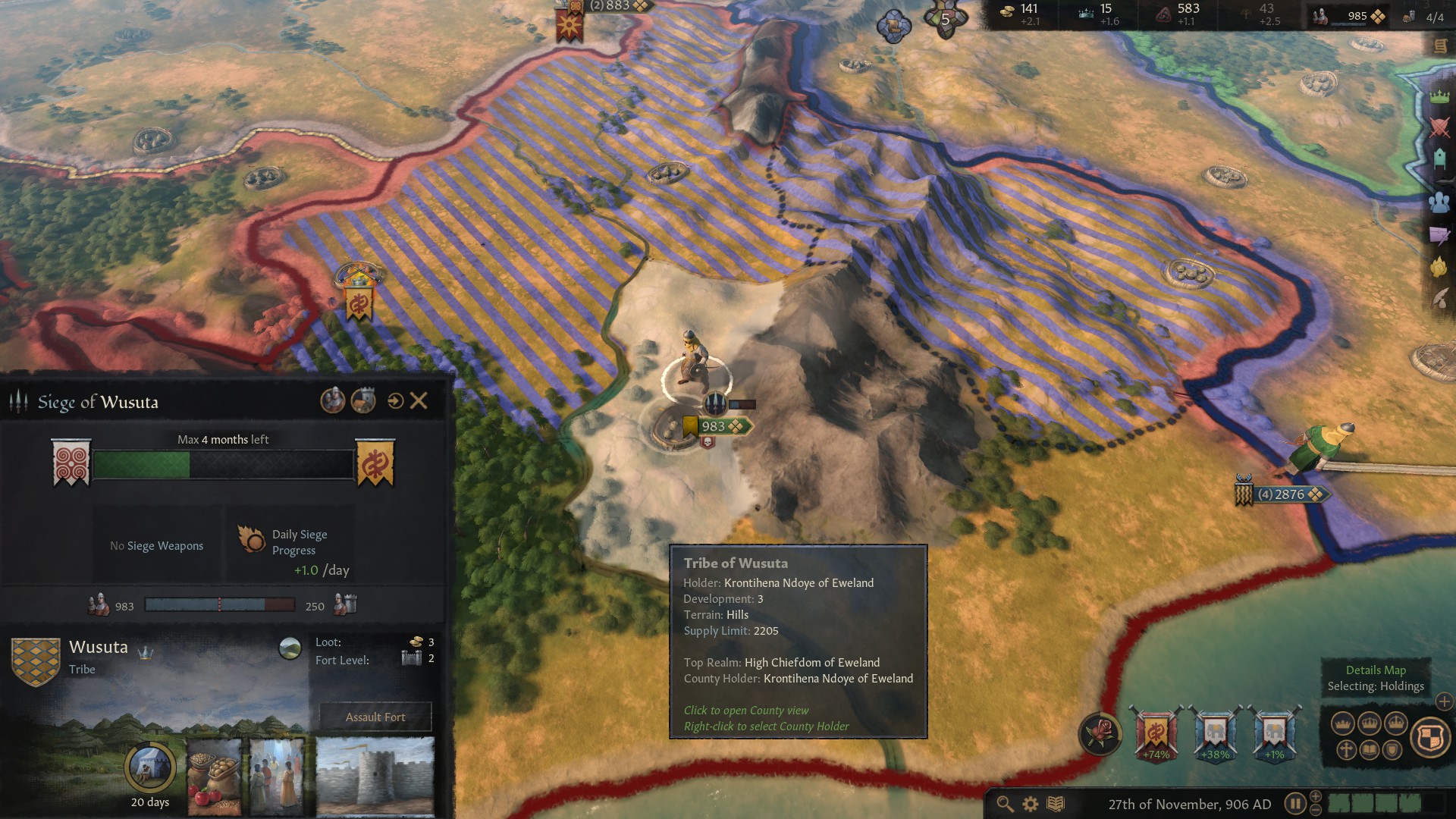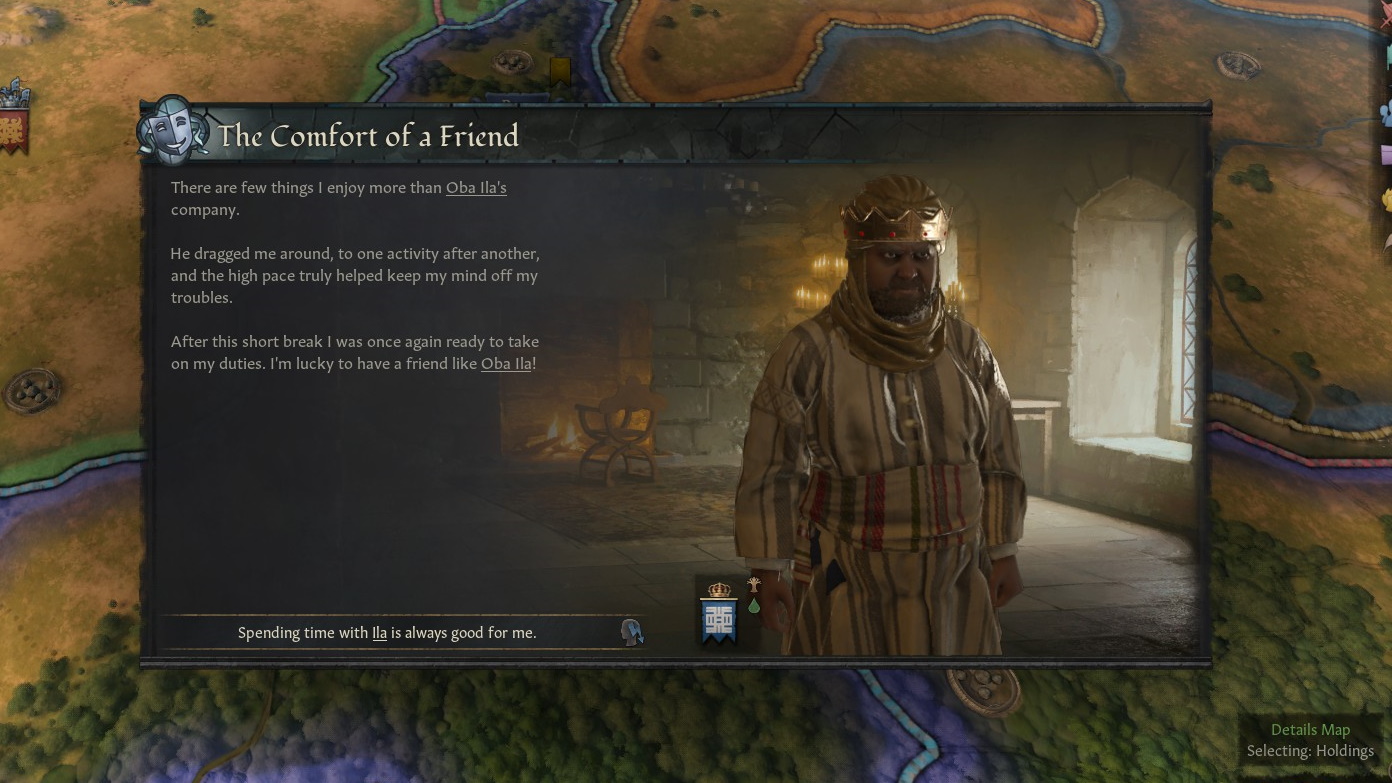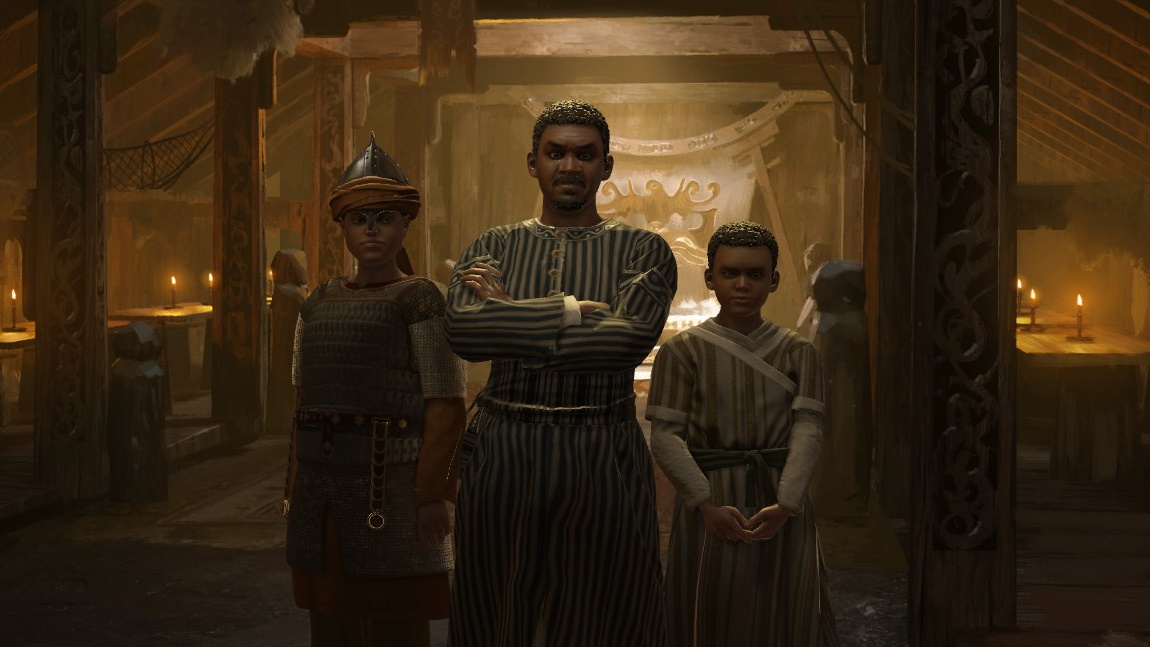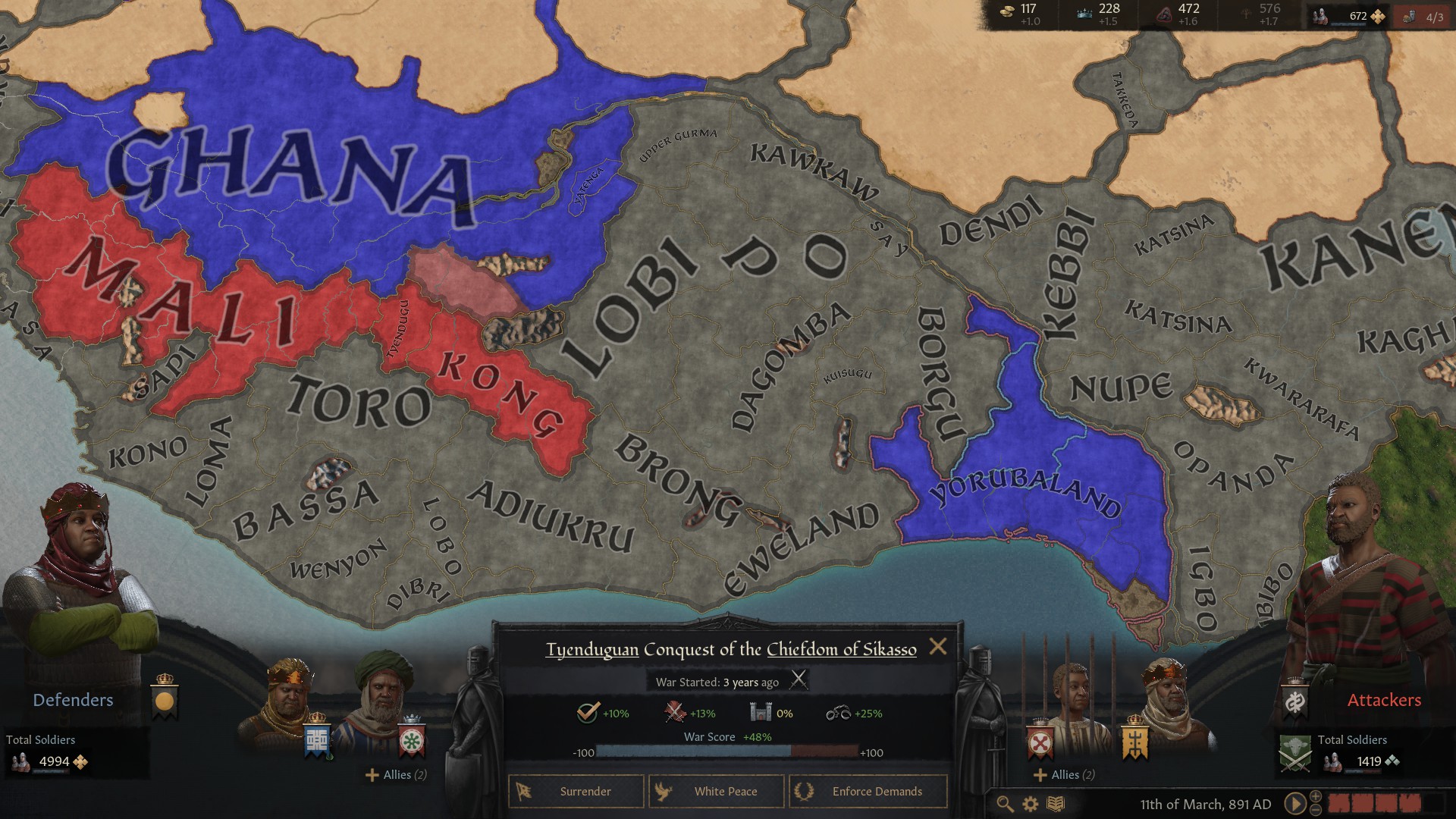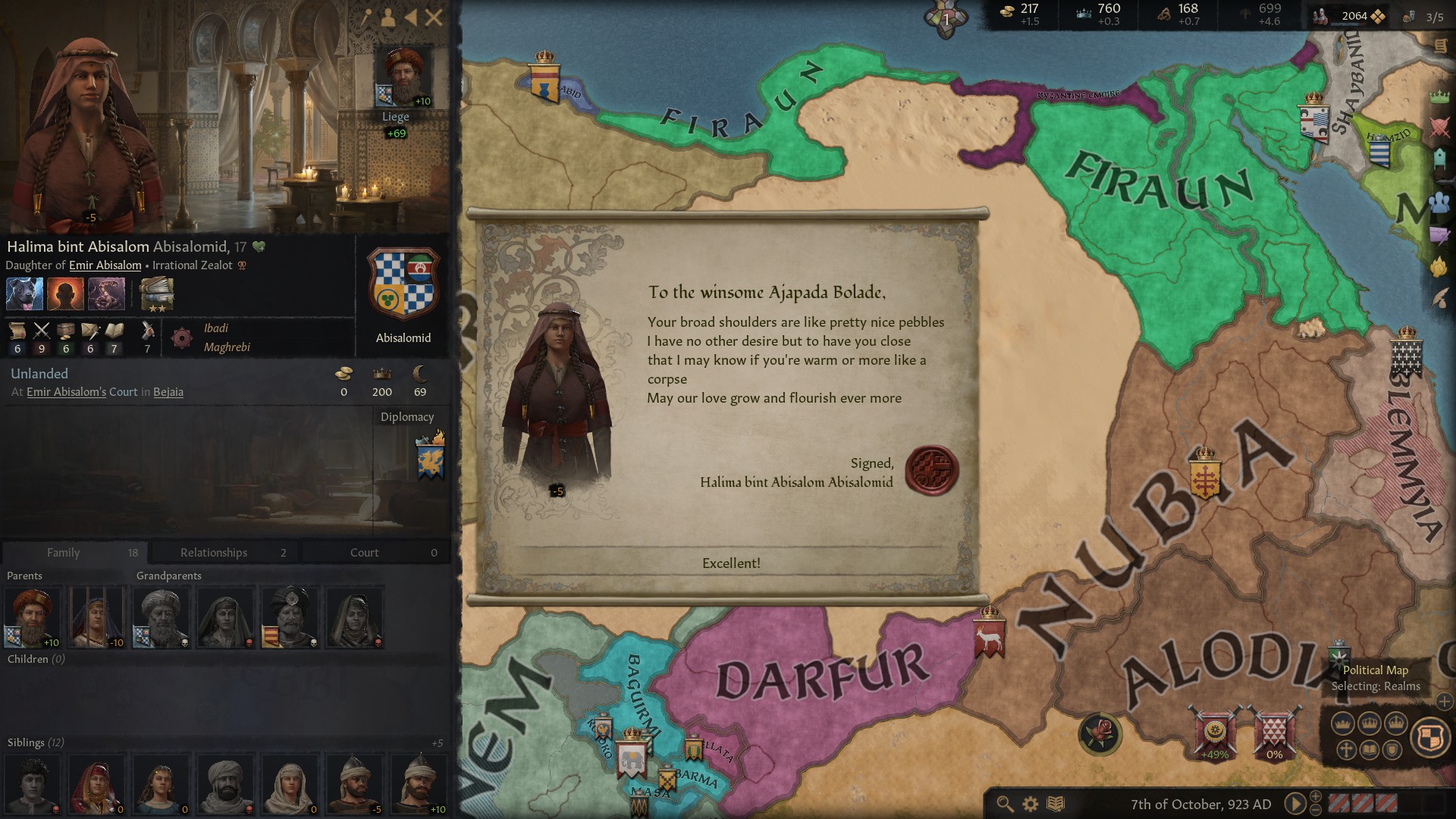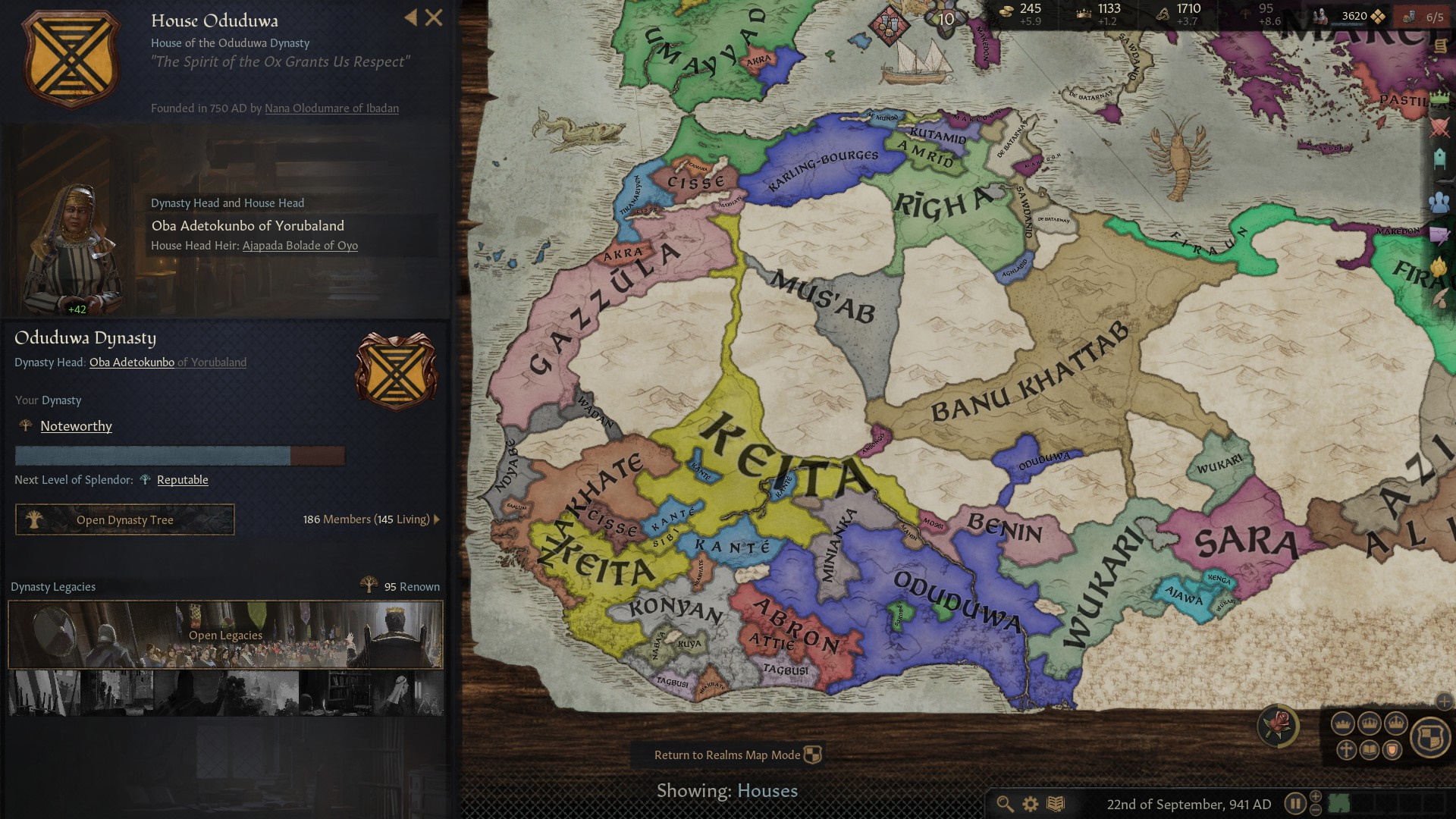But anyway. ANYWAY. Crusader Kings III is out now, and while it couldn’t possibly incorporate eight years of add-ons, I wanted to see how it compares to vanilla CK2. Does a non-feudal ruler play any differently? Is it possible to thrive outside the default setting of kingly Europe? What’s it like to start out as an obscure chief at the distant edge of the enormous world map? Let’s find out. This is Nana Oyo, of house Oduduwa. He is the High Chief of Oyo, a modest realm of three chiefdoms on the West bank of the Niger. If history takes its course again, it will form a small but highly influential empire, and together with the neighbouring kingdoms of Ife and Benin will dominate much of West Africa for over one thousand years, right up until England comes along and ruins everything as usual. By 2020 it will form the Northwestern third of Nigeria, but right now it is the year 867 and there are no empires in sight. I use “chief” because Oyo is a tribal realm in CK3, not the feudal one many European kingdoms default to. This means several things. It limits how developed a province can be internally, a big disadvantage in the long term. But tribal rulers can declare wars of conquest with little penalty, and raise specialist standing armies by spending Prestige (an abstract resource each character generates based on status, characteristics, and actions) instead of gold. I can also raid neighbours for cash and prisoners by sending an army to their towns for a few weeks without starting a war or making enemies. It took me a while to fully benefit from this, as when you’re weak, tribal neighbours can fight you off or raid back. It took several decades of bold-faced conquest to realise how much I’d been leaning on their strengths, and how much of CK3 is designed to get you into the right mindset for whoever you’re playing as. You can’t rely on intrinsic authority, legality, or feudal politeness. If a town has money and their army is small or distracted, you can just raid it. If you want to control a province, you can just take it. Tribal powers have a directness that rewards the bold and the covetous. That’s not to say they’re brutal (any more than other government types) or stupid, though. Survival in West Africa takes more than violence, and if anything alliances are more crucial, because anything you take can be taken back. People respect intelligence, faith, and plain likeability, so it pays to be a wise chief. Skulduggery is certainly an option, but down here in Oyo, my people’s religion leads to large families and lots of heirs, so murdering my way to victory would kill off half my own house. Crusader Kings 3 has a religion system so exciting that I’ve had to write two piles of notes about it to get them out of the way. There aren’t just religions now; there are enough religions to make Richard Dawkins tweet himself into a liquid. Each character has a faith, which is a specific denomination of a larger religion (Christianity, Buddhism, Kordofan, etc. Some have only a single faith until someone - perhaps you - invents a new branch). Each faith is a combination of three tenets, of which there are dozens, each changing several aspects of the game. Oyo and most of its neighbours have the Orisan (I am told “Òrìṣà-Ifá” is more correct, but will stick with what I hope are acceptable transliterations) faith, initially the only Yoruban religion. One of its tenents is Ancestor Worship, which gives us extra benefits for pilgrimage, and lots of extra prestige from getting married and banging out sprogs. Ancestor worship also means we’re a slightly more tight knit family than most. Orisa is also an impressively equitable faith. Men and women of Oyo inherit equally, with nobody batting an eyelid at female warriors, chieftains, or priests. Anyone can divorce, homosexuality is fine, clergy are duty-bound to take care of the poor, and we’re pluralist: although we still consider other faiths hostile, we’re less of a dick about it than most. Oh, and rulers can have concubines or consorts. Between his wife and three concubines Nana Oyo ends up with fourteen goddamn kids, but our succession laws mean they’ll all inherit equally, so they’re all prone to liking him. Thus, the high chiefdom of Oyo is set up with a family of friendly rulers at our back, and both weak and strong neighbours. It’s time to start playing Agar.io with these suckers. My marshal Ayofemi is young, hot, and chill, so I make her my first concubine before sending her off to conquer the chiefdom of Bussa, capturing the chief’s wife Lambu Debo in the process. According to the war progress screen, “no important prisoners” have been taken. Harsh. Experimentally, I take her as a concubine too, and then it begins. Ayofemi and I bond over her killing a dude and become soulmates, and eventually bash out six kids together. I want my kids to get a good education, so I send him to the most skilled person within emissary range, the High Chieftess Daurama of Kano, for her to raise. She accepts, likely confused. Nobody ever gives their firstborn son away to another ruler to train up because it’s unbelievably stupid, but on the other hand, I dislike babies. Plus if something goes wrong I can replace it with basically any other baby. That said, she does open her acceptance letter with “To the loathsome Nana Oyo”. This might be a mistake. I recognise that other people care about their kids, so I’m horrified when I realise that by taking Lambu Debo as a concubine, I separated her from her daughter. Her former husband doesn’t even seem to care that she’s gone. He already hates me, so I go ahead and conquer his remaining land too, hoping the sprog will join us. But alas, the former chief of Bussa flees, taking the sprog with him. The two of them become “wandering”, a wonderfully evocative status that could lead them anywhere. Someday I will rescue young Zaynab, unless of course I can’t find her, or if I forget. For now I focus on security. Between Nana Oyo’s progress through the “intrigue” skill tree, and my spymaster’s constant efforts to dig up everyone’s secrets, I’m able to blackmail my hostile, powerful northern neighbour, Duke Farbas Baadindiye of Borgu, into an alliance. This way he can’t attack me without widespread condemnation (and of course I’d then tell everyone he’s secretly humping his vassal’s shaman), so I can focus on conquering the weaker lands around him until we’re big enough to take him too. I also unlock a perk that lets us extort people for money if we uncover an embarrassing or criminal secret about them. I proceed to do this to Duke Farbas for the next 20 years. Incidentally, the shaman’s daughter is also boffing the vassal, for which Farbas could simply lock them both up if he knew. Even if you don’t use them, sitting at the centre of a web of secrets provides its own entertainment. Meanwhile, I too have been screwing around, but unlike Farbas I don’t deny it. My wife and concubines aren’t happy, but they get over it. Besides, I’m the High Chief of Oyo. Who’s gonna arrest me? Well. A higher authority could. But when a kingdom forms to the South, it’s held by my brother Ila, now Oba Ila of Yorubaland. Thanks to my pitching in with his wars, he’s also my friend, so I immediately offer him my fealty. He accepts, and I find out that I can ask him to pardon my adultery (a crime under Orisa), which he does immediately. It turns out that he, too, has the “adulterer” trait, and we even get a slight relationship bonus for it. He then offers to make me his marshall. I have literally zero martial skill. We’ve only had a king for two weeks and the corruption has already started. Driven mad by my success, I go into Chaos Mode. I discover that a rival’s spymaster is into me, and that she’s bisexual, which is shunned in her culture but not mine. I attempt to heroically kidnap her into a life of freedom before realising I don’t actually know any other gay or bi women and I can’t send her back. Meanwhile, feeling resentful that nobody lets me look after their kid, I fabricate evidence against another chief, make myself his daughter’s guardian, and raise her very well, in a manner that surely messes with my own children’s heads for their entire lives. When my son and heir’s educator, the chieftess Daurama, dies at the hands of her own husband’s spymaster, I implement a Marcus Boone rule of handing over custody of my children to whoever killed their last guardian. It seems that the rulers with the highest skills tend to have gained them by making their lives a constant knife fight with Death. The main upshot is that by the time my first heir Ayotunde comes of age, he a sadistic coward who is, perhaps wisely, content with a quiet life. Another daughter drops out of one of my women directly onto the conveyor belt I’ve built along the Niger. The only one I take any care of is my bastard daughter Abeo, who eventually goes out into the world alone, and shows up having founded her own dynasty. Impressed by her spirit, I use my influence to find her a husband who’ll marry matrilineally, and conquer some land for them. A chief should put his own house first, but it is 2020, and by law, all games must be about being a good dad. I search once more for Zaynab, the daughter of Lambu Debu, the concubine I took prisoner from a neighbour. She is holed up with her father in Kano. The guy I kicked out of his land just HAPPENS to show up in the court where my son is being raised? There is no way he isn’t up to something. I have someone kidnap the girl, which I’m told has an 85% chance of failing. The arbitrary gods of Chaos Mode reward my devotion, and she is finally reunited with her mother. All three of them now hate me, but I don’t care. Catching on to the mood, my dear concubine and soulmate Ayofemi accidentally whips herself to death while indulging in a fetish. My scheming is not without a downside. The new “stress” system punishes Nana Oyo (now Ajapada Oyo, having raided, taxed, and extorted enough money to form a duchy) for going against his nature so often. Although he has the “Deceiftful” trait, he is also “Just”, which I’ve actually adhered to, being conniving but mostly fair. But each time I’ve done something underhanded it has stressed poor Oyo out, and this has caused him to suffer a few mental breaks. He’s picked up an unseemly habit of visiting brothels to relax, and spends a few years as a recluse. So I let things unwind, and switch Oyo over to focusing on stewardship. By now the kingdom of Yorubaland is thriving. As my kids come of age, I marry some off and let the rest either join my army as champions or hang around my court until they get bored and go out on their own adventures. not one of them ever lets me down, and one even marries a young woman who bonds with Oyo and becomes his mentor. They’re good kids. If only I had learned more than three of their names. For the rest of his life, Oyo consolidates, going on pilgrimages and developing the land. Tribes get minimal benefit from this, but I like to think it makes life better for everyone. It pleases me to look at the global map of development level, where Yorubaland is forming a little orange hub in a lake of purple. We’re slightly behind Ghana, but we’re almost level with a fair chunk of Europe, and are beating Ireland at least. Of course, most of South Asia and the Muslim world are, accurately, centuries ahead of everyone else, but that’s a problem for my great-great-grandkids. By the time Ajapada Oyo dies of old age at 70, his chiefdom is a proud and prosperous one. The Oduduwa dynasty, now the largest on earth by quite some margin, is ascendant. After a generation, Yorubaland covers 23 tribes/provinces/counties/whatever, which is more than half of the densely-packed, and currently very divided England. Ireland has 12. We are a harmonious, loyal family under the wise Oba Ogburuu, and poised to unite the people of the Niger. The game rather ignominiously summarises Oyo as treacherous, covetous, and adulterous, which seems a bit unfair given that most of that was 30 years ago. Oyo’s granddaughter Bolade becomes the new High Chief of Oyo. She is an impatient lesbian who will go on to double our landmass, beat cancer, and take a giant peasant as consort who leads her armies and trains her daughter to fight, who in turn goes on to avenge his murder and kill the queen’s heir in a duel. She also takes to wearing the sick face mask seen in the header after a botched operation. At one point Bolade gets so frustrated with the local women that she invents 10th century Tindr, and starts going through portraits of foreign hotties like your uncle about to get scammed by a Ukrainian bride. It is as though lesbians have the power to psychically identify each other through oil paintings, across a distance of thousands of miles, which is only somewhat true. I leave her in her fifties, scarred but triumphant, martial of the third largest army in the world, exalted among men, avenger of giants, and gay as a window, as the star of House Oduduwa rises over the gulf of Guinea. So. This playthrough has been great, and answers the question of how Crusader Kings 3 handles Africa as best I can. The tribal powers’ looser rules about conquest, and ability to bash out armies with prestige can make a big difference if you lean on them. None of this is specific to Africa, mind. There are tribal powers all over the world, from Alba to Zhetysu, some immensely powerful. What distinguishes them more is their religion. Orisa’s rather enlightened interpretation of the divine, and tendency towards large and loyal family made for a different mood than I’m used to, and I was happier to spread it than I usually am the more dour, backwards 10th century Catholicism my previous games lumped me with. A fair part of it is, for lack of a better word, psychosomatic, but the series is firmly a roleplaying game to me, not an exercise in efficiency or powergaming. It provided a welcome new layer of character. The religion system is far more exciting than a game about staring at a map for 300 hours should be. Sure, most of Africa is resolutely Pagan, and thus doesn’t get anything as dramatic as the crusades or jihads, but I can hardly fault a series called “Crusader Kings” for placing emphasis on the Mediterranean (plus there’s an option to start with all religions randomised. Want a world with a Tengri Duke of Capua and Vaishnavi Middlesex? I have seen it). I don’t believe you could play as an African ruler and come away with an understanding of what it was like there a thousand years ago. I also don’t think that people should be grateful for any representation at all even if it’s poor. But I think Crusader Kings 3 does a good job of representing, not just including, Africa as a place full of cooks, poets, drunks, warriors, masons, priests, inbred kings, and big gay cancer patients like anywhere else. I haven’t found the specialised depth I was hoping for (and didn’t really expect to), but nor do I feel like I’m just playing as England with African names. It makes West Africa as interesting to play in as anywhere else. The chiefs of Yorubaland have immensely improved my week. They’re an excellent place to start out.
